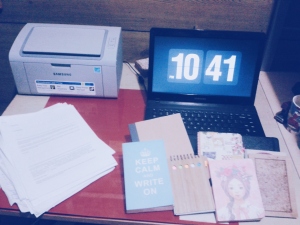
Words read are also forms of haunting.
This seems obvious, until one sits down to notice what is given, and therefore ignored. The easiest example is breathing. I argue something else. The most indignant right is only so because it is the most basic–that is, somewhere to stay and thrive.
A memory from the other side, in a room of chairs and one table, years ago: the instructor asking us, What else do mothers tell their children but “Tahan na”? Then: And where do you go home? Tahanan, tahanan.
Everything around, inside, and about a threshold can also haunt, for all that everything happens too fast. Just yesterday we resisted, the reason for this resistance being hope. So one sees that when every emotion has been wrung dry, motherhood statements are dangerous because accessible, because seemingly facile, but most of all, because even in one’s insistence on intellect, these comforting words catch one’s attention and keep histrionics at bay.
Hope, then, is dangerous because even in one’s meandering in matters that seem more urgent, even then hope rears its head. Summer reading, from what seems like ages ago:
It is important to recollect the energy, dynamism, and optimism of the decolonizing and immediate post-independence era, both for the sake of the historical record and also to enable us to register the successes of this period, however slender, partial, provisional, or unsustainable they proved to be in the long term. (Lazarus 5)
Easier to ensconce oneself in another discourse altogether. After all, distance is everything. Of course, this is also one’s excuse, and what betrays one’s cowardice. If another leaves, that is enough to justify loss of contact; if plans change, lives need not intersect. This is laziness at its best. When life threatens to leave me behind–life, I say, not merely an individual or childhood connections–my own reaction is half-hearted. One would think memory holds meritocracy, but in fact it is easier not to resist. Only half-listen to future plans; imagine a vague future where all these are possible and money can change hands. It’s all very exciting, a little too over-the-edge, so what else can possibly await me but a precipice and a long, long fall?
The school memory says, tahan na(n). Indicates: too much space for garden in the front and grotto in the middle; muddy, rocky expanse at the back, room called “hall” but smaller than one; squarish spaces with paint jobs gone wrong; all the furniture that once was.
Turn to fiction, then, because there, everything can be found. Enough research will tell you what year a character should have lived in given his age in the textual present. Proper Googling will describe riots to you in detail. But here we need nothing so mundane or dramatic.
A constant favorite (those are forms of haunting, too) in times like these:
People come to me <…> They begin to talk and I go with them back to their childhoods <…> Between their words I see the way the light fell across the wooden floor. The way he lined his soldiers up under the hem of the curtain. How she laid out the little toy teacups. Their childhoods, because it is only the ones who were children who come to me now. The others have died. When I first started my business, he said, it was mostly lovers. Or husbands who had lost their wives, wives who has lost their husbands. Even parents. Though very few–most would have found my services unbearable. The ones that came hardly spoke at all, only enough to describe a little child’s bed or the chest where he kept his toys. Like a doctor, I listen without saying a word. But there’s one difference: when all of the talking is through, I produce a solution. It’s true, I can’t bring the dead back to life. But I can bring back the chair they once sat in, the bed where they slept. (Krauss, Great House)
There is an audacity here: I write to become separate from these things, but my attempt is to establish presence. This is what disturbs me in Danielewski, previously discussed. I only root for Sam and Hailey because even the cover flaps tell me to. But as reader, I can only ask how Hailey goes beyond “the US”? Feb 18 2052 from her epic poem tells you: “Because without him I am / only revolutions of ruin,” but something about her calm (in contrast to her lover) tells you she is capable, too, of soaring beyond Sam: “I’m the prophecy prophecies pass. / Why desire dies at last” (Danielewski, Only Revolutions).
So I am left to wonder if the frenetic nature of current events is just another excuse to move. I think to myself: I must keep up with the pace, too! But for a world in constant motion, with love always in transit, where is stasis, where is departure? Note to self: not everyone who leaves is a traitor; not everyone who stays is good for you.
Tahanan: But if I leave too soon and rip the band-aid from my skin without a second thought (less pain always the excuse), I fear that the desire will, in fact, not die, and will merely be rescheduled.
Things don’t last forever. The bed that one man remembers as the place where his soul was overwhelmed is, to another man, just a bed. And when it breaks, or goes out of style, or is no longer of use to him, he throws it away. But before he dies, the man whose soul was overwhelmed needs to lie down in that bed one more time. He comes to me <…> So even if it no longer exists, I find it <…> I produce it. Out of thin air, if need be. And if the wood is not exactly as he remembers, or the legs are too thick or too thin, he’ll only notice for a moment, a moment of shock and disbelief, and then his memory will be invaded by the reality of the bed standing before him. Because he needs it to be that bed where she once lay with him more than he needs to know the truth. You understand? And if you ask me whether I feel guilty, whether I feel I am cheating him, the answer is no. Because at the moment that man reaches out and runs his hand across the rail, for him there are no other beds in the world. (Krauss, Great House)
But living with what is familiar is also terrifying, not because it hints at missing out on something else, or implies redundancy, but because it denies transcendence. When one’s dwelling becomes a site for ways of old, ways that are cyclical, “experience” must turn to “event,” must be turned into what seems impossible: concrete, yet metaphysical. Thus,
Ziarek argues that the political radicality of the avant-garde should be understood primarily as an attempt to reconfigure experience as event. By the “event-structure” of experience, Ziarek means an experience that is, like the “propriative event” (Ereignis) in Heidegger’s phenomenological formulation, always a “simultaneous coming into presence and withdrawal in which what is becomes measurable and representable only at the expense of suppressing historicity” (Ziarek 2001, 13). Because Ziarek’s Heidegger is deconstruction’s Heidegger <…>, Ziarek’s event-structured or historicized experience is never a self-identical “temporal punctuality or an instant presence, but instead, a dynamic and open-ended field of forces…” (Nieland and Juengel 195)
Thus to accept politics as aesthetics, as naturalized, too, on some level brings to the fore a nugget: fascism in an archipelago, and what feels like it in the smallest unit of this archipelagic society–gardens, grottos, yards, familiar spaces–is ridiculous, unjust. Previous summer reading again, this time Quentin Skinner: look at the question that the answers stand in position to (Scott 391). Does it matter, then, if you choose one space over another?
The usual suggestion, also a temptation, is to lay back and let yourself be surprised. But critical mass demands otherwise: “uncanny discipline…as certain political imperatives in our own time urge us…” (Nieland and Juengel 191). And something similar must happen on the national level, too, this urgency in a pre-election season that seems to aestheticize crass fist fights and the teleserye-level search for a daughter’s origins.
But also, in this urgency: tahanan; retain control. This is calm.
*
Danielewski, Mark Z. Only Revolutions. New York: Pantheon Books, 2006. Print.
Krauss, Nicole. Great House. New York: W.W. Norton & Company, 2010. Print.
Lazarus, Neil. Introduction. The Postcolonial Unconscious. Cambridge: Cambridge U P, 2011. Print.
Nieland, Justus and Scott Juengel. “Review: Benjamin’s Urgency.” CR: The New Centennial Review 5.2 (2005): 189-213. PDF.
Scott, David. “The Social Construction of Postcolonial Studies.” Postcolonial Studies and Beyond. Eds. Ania Loomba, et al. Durham: Duke U P, 2005. 385-400. Print.



